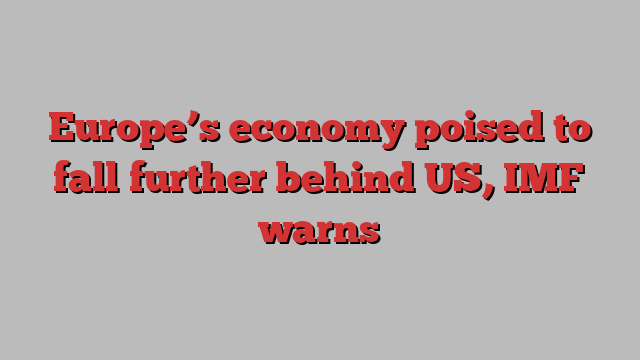
Stay informed with free updates
Simply sign up to the European economy myFT Digest — delivered directly to your inbox.
The gap between European and US gross domestic product is set to widen further by the end of the decade, the IMF warned on Thursday, as it sounded an alarm about the continent’s “lack of business dynamism”.
The IMF said in its latest economic outlook for Europe that an ageing workforce and low productivity growth would reduce the continent’s annual GDP growth rate for the 10 years until 2029 to just 1.45 per cent. In the US, the average growth rate over the same period is estimated at 2.29 per cent.
American growth has outpaced Europe’s since the global financial crisis, particularly since the Covid-19 pandemic.
Alfred Kammer, director of the IMF’s Europe department, said the region had “fundamental” problems that went back decades, stressing that GDP per capita, adjusted for purchasing power, “was the same in the US and the EU” at the turn of the millennium.
“Over the next two and a half decades, we had a widening gap,” he told the Financial Times, noting that per capita income in Europe today is 30 per cent lower than in the US. “It’s a large gap [which] didn’t exist before, but exists now.”
He added that the pandemic temporarily exacerbated the problem, with the fund estimating that Europe’s average growth rate has dropped by 0.6 percentage points compared to the two decades up to 2019. By contrast, in the US, projected growth for the 10 years to 2029 has increased slightly, compared with the previous decades.
The IMF said Europe’s poor prospects were linked to factors such as low levels of business investment and too little cross-border activity, along with much lower productivity than in the US.
The fund said the divergence between productivity levels in the US and Europe encompassed all sectors, but was particularly stark for technology.
“European [tech] productivity has been virtually stagnant since 2005. It has grown by nearly 40 per cent in the United States,” the fund said.
The continent’s venture capital industry, which is only one-quarter of its size in the US, was another of the reasons “why Europe has a broader lack of business dynamism”. In Europe, the share of new companies that exist for five years or less was “only about half that in the United States”.
The fund backed former ECB president Mario Draghi’s report, published earlier this year, which argues Europe must invest more and increase competitiveness. It called on Brussels to take more measures to integrate the region’s economy.
“For Europe to achieve its full growth potential, a larger and more integrated single market — especially for goods, services, and capital — is needed,” the fund said.
However, Kammer acknowledged that achieving more integration was “tough”.
“We know . . . the solutions,” Kammer said, but added that “national and vested interests are holding back progress”.